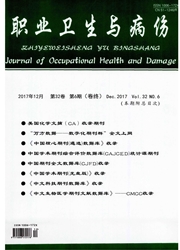

 中文摘要:
中文摘要:
目的了解成都市某城乡结合社区居民对乙肝相关知识的认知状况,分析造成认知差异的影响因素,为城乡结合社区开展乙肝健康教育活动的方式方法提供科学依据。方法采用自设问卷于2010-08/2011-08在成都市某城乡结合社区的居民开展乙肝相关知识调查。结果调查对象242人中从未做过乙肝血清学检测的占41.03%,其中农村户口者占77.39%,城镇户口占22.61%,差异有统计学意义(P〈0.05);对乙肝的3大传播途径(血液、母婴传播和性传播)能正确认识率约50%,对不传播乙肝的途径如咳嗽、喷嚏、共餐等知晓率不高,初中以下文化程度者选择率达85.16%,高中及以上文化程度者选择率为14.84%,差异有统计学意义(P〈0.05);约36.6%居民对乙肝感染者存在不同程度的歧视态度,服务行业类居民愿意与乙肝患者就餐的人数占36.91%,非服务行业类居民占63.09%。结论成都市某社区不同户籍、不同文化层次、不同职业居民对乙肝的重视程度、相关知识了解情况及对感染者歧视度上存在偏差,应针对性的进行社区健康教育,以减少社区居民的乙肝感染率。
 英文摘要:
英文摘要:
Objective To investigate the knowledge on hepatitis B among the rural-urban fringe community residents of Chengdu,and to provide scientific evidences for improving the ways of health education on the disease.Methods Self-administered questionnaire survey was used to investigate 242 residents in Aug.2010 to Aug.2011.Results There were 41.03% residents without history of hepatitis B serum examination,among which the rural registered residents accounted for 77.39% and the urban registered residents accounted for 22.61%,with statistically difference(P〈0.05).About 50% community residents were aware the three ways of hepatitis B' s transmission.The awareness rate of the non-communicable ways such as interdine,coughing and sneezing was low,namely,there were 85.16% residents with junior school or lower education degree and 14.84% residents with high school or higher education chose the incorrect answer,with statistically difference(P 〈0.05).A percentage of 36.6% residents exhibited discrimination attitude to the hepatitis B virus infectors.Those chose to reject to have dinner with the hepatitis B virus infectors accounted for63.09% in service industry and 36.91% in common industries.The difference has statistically significant(P〈0.05).Conclusion Relevant knowledge and discrimination to hepatitis B is different across the residents of a rural-urban fringe community of Chengdu regarding census register,education degree and profession and thus targeted community health education should be conducted to reduce the hepatitis B infections.
 同期刊论文项目
同期刊论文项目
 同项目期刊论文
同项目期刊论文
 期刊信息
期刊信息
